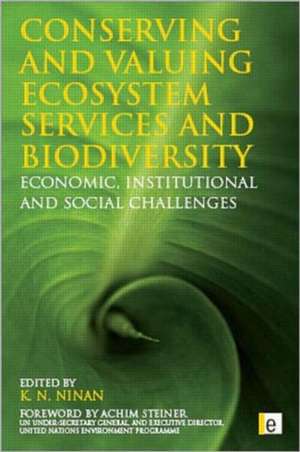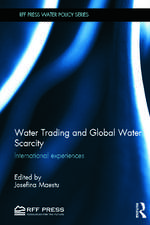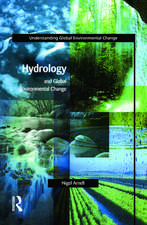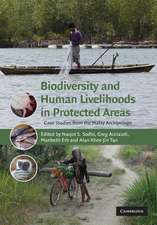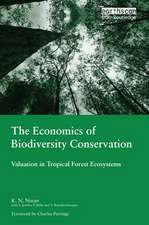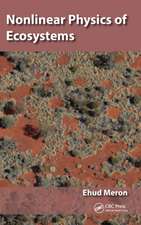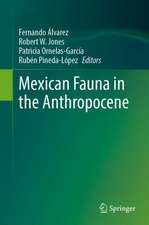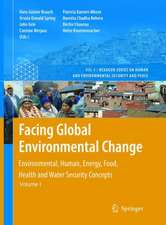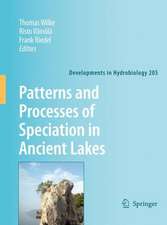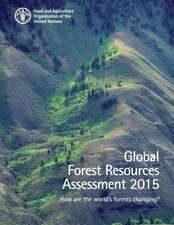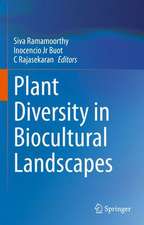Conserving and Valuing Ecosystem Services and Biodiversity: Economic, Institutional and Social Challenges
Editat de K. N. Ninanen Limba Engleză Hardback – 18 dec 2008
The book spans the globe with case studies drawn from a cross section of regions and continents including the UK, US, Europe, Australia, India, Africa and South America.
| Toate formatele și edițiile | Preț | Express |
|---|---|---|
| Paperback (1) | 425.86 lei 6-8 săpt. | |
| Taylor & Francis – 29 oct 2010 | 425.86 lei 6-8 săpt. | |
| Hardback (1) | 1012.89 lei 6-8 săpt. | |
| Taylor & Francis – 18 dec 2008 | 1012.89 lei 6-8 săpt. |
Preț: 1012.89 lei
Preț vechi: 1235.24 lei
-18% Nou
Puncte Express: 1519
Preț estimativ în valută:
193.82€ • 202.77$ • 161.00£
193.82€ • 202.77$ • 161.00£
Carte tipărită la comandă
Livrare economică 02-16 aprilie
Preluare comenzi: 021 569.72.76
Specificații
ISBN-13: 9781844076512
ISBN-10: 1844076512
Pagini: 432
Dimensiuni: 156 x 234 x 36 mm
Greutate: 0.82 kg
Ediția:1
Editura: Taylor & Francis
Colecția Routledge
Locul publicării:Oxford, United Kingdom
ISBN-10: 1844076512
Pagini: 432
Dimensiuni: 156 x 234 x 36 mm
Greutate: 0.82 kg
Ediția:1
Editura: Taylor & Francis
Colecția Routledge
Locul publicării:Oxford, United Kingdom
Cuprins
Introduction Part 1: Biodiversity, Ecosystem Services and Valuation Total Economic Valuation of Endangered Species - A Summary and Comparison of United States and Rest of the World Estimates The Economics of Fish Biodiversity: Linkages between Aquaculture and Fisheries - Some Perspectives Biodiversity Conservation in Sea Areas Beyond National Jurisdiction: the Economic Problem Making the Case for Investing in Natural Ecosystems as Development Infrastructure: the Economic Value of Biodiversity in Lao PDR Non Timber Forest Products and Biodiversity Conservation - A Study of Tribals in a Protected Area in India National Parks as Conservation and Development Projects: Gauging Local Support Part 2: Incentives and Institutions Payments for Ecosystem Services: An International Perspective Developing mechanisms for in situ biodiversity conservation in agricultural landscapes Institutional Economics and the Behaviour of Conservation Organizations: Implications for Biodiversity Conservation Part 3: Governance An Ecological Economics Approach to the Management of a Multi-purpose Coastal Wetland East African Cheetah Management via Interacting Political and Ecological Process Models Co-Management of Protected Areas: A Case Study from Central Sulawesi, Indonesia Part 4: IPRs and Indigenous Knowledge Intellectual Property Rights and Problems in the Protection of Indigenous Knowledge: A Case Study of the Philippines Legal Reforms Protecting Traditional Knowledge: A framework based on Customary Laws and Bio-Cultural Heritage Part 5: Climate Change Adaptation to Climate Change and Livestock Biodiversity: Evidence from Kenya Climate Change and Biodiversity in Cameroon - A Socio-Economic Assessment of the Impacts of Climate Change on Coastal Ecosystems and Livelihoods in South Western Cameroon
Notă biografică
K. N. Ninan is Professor of Ecological Economics at the Institute for Social and Economic Change, Bangalore, India, and Visiting Professor, Donald Bren School of Environmental Science and Management, University of California, Santa Barbara, USA.
Recenzii
'Brings together a diverse range of expertise to address the economic, social and institutional challenges confronting policy makers in the conservation of biodiversity and maintenance of ecosystem services. The empirical evidence of the linkages between biodiversity conservation and livelihoods that the case studies provide will be of considerable interest to policy makers.' – C. S. Srinivasan, Experimental Agriculture, 2012.
'Chapters cover everything from single species to small human communities, to watersheds, to large ecosystems not confined to a single nation. Methods include contingent valuation and willingness to pay (not neglecting their drawbacks), game theory, case studies, trend analysis, and complex modeling. However, this description does not mean that the book is a jumble of unrelated articles. The selection of articles allows broad coverage of the topic and progresses logically through sections on valuation, governance, intellectual property rights, and climate change. Some of the examples show the clear relationships between policy, economics, culture, and institutions, avoiding the myopic view of a topic that is too common in edited works. Most chapters are jargon free and written so that one need not be a specialist in a particular field in order to understand and appreciate the research. Summing Up: Highly recommended. Upper-division undergraduate through professional collections.' – B. D. Orr, Michigan Technological University, USA in Choice, 2009.
'What is refreshing is that although there are some examples from Europe and North America, most chapters focus on case studies from underdeveloped countries like Laos, Kenya, India, Philippines and Cameroon.' – David Walton, British Ecological Society, 2010.
'Chapters cover everything from single species to small human communities, to watersheds, to large ecosystems not confined to a single nation. Methods include contingent valuation and willingness to pay (not neglecting their drawbacks), game theory, case studies, trend analysis, and complex modeling. However, this description does not mean that the book is a jumble of unrelated articles. The selection of articles allows broad coverage of the topic and progresses logically through sections on valuation, governance, intellectual property rights, and climate change. Some of the examples show the clear relationships between policy, economics, culture, and institutions, avoiding the myopic view of a topic that is too common in edited works. Most chapters are jargon free and written so that one need not be a specialist in a particular field in order to understand and appreciate the research. Summing Up: Highly recommended. Upper-division undergraduate through professional collections.' – B. D. Orr, Michigan Technological University, USA in Choice, 2009.
'What is refreshing is that although there are some examples from Europe and North America, most chapters focus on case studies from underdeveloped countries like Laos, Kenya, India, Philippines and Cameroon.' – David Walton, British Ecological Society, 2010.
